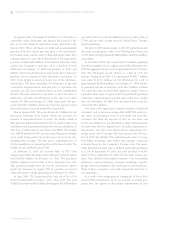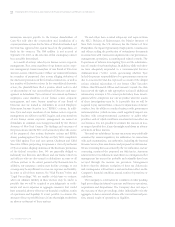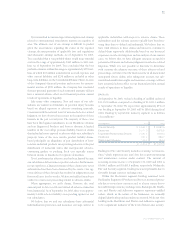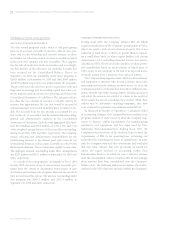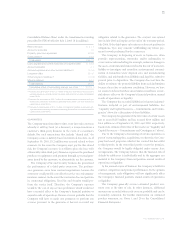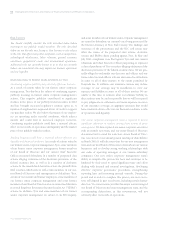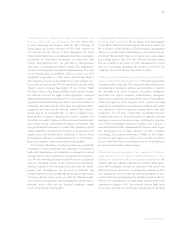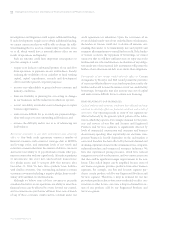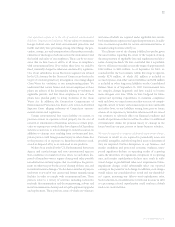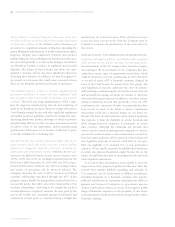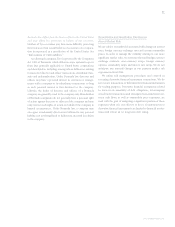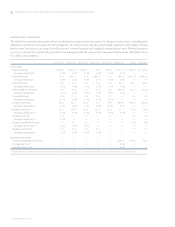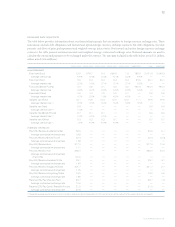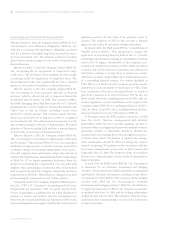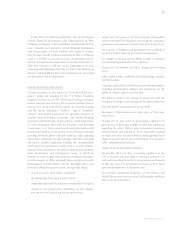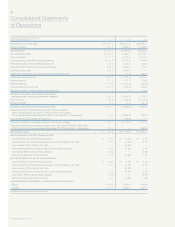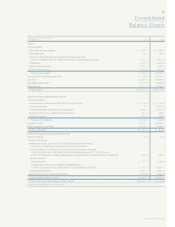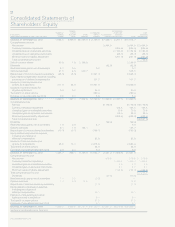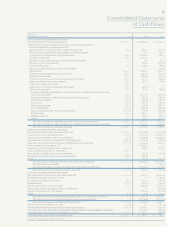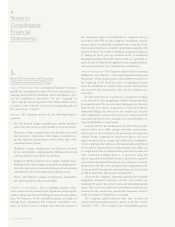ADT 2003 Annual Report Download - page 62
Download and view the complete annual report
Please find page 62 of the 2003 ADT annual report below. You can navigate through the pages in the report by either clicking on the pages listed below, or by using the keyword search tool below to find specific information within the annual report.
60
We are subject to a variety of litigation in the course of our busi-
ness that could cause an adverse effect on our results of operations
and financial condition. In the ordinary course of business, we
are subject to a significant amount of litigation, including liti-
gation alleging the infringement of intellectual property rights,
litigation alleging anti-competitive behavior and product
liability litigation. Patent infringement and anti-trust laws per-
mit successful plaintiffs to recover treble damages. In addition,
our Healthcare business is subject to regulation and potential
litigation. The defense of these lawsuits may divert our man-
agement’s attention, and we may incur significant expenses in
defending these lawsuits. In addition, we may be required to
pay awards or settlements that could cause a material adverse
effect on our financial condition and results of operations.
Our healthcare business is subject to extensive regulation by the
government and failure to comply with those regulations could
have an adverse effect on our results of operations and financial
condition. The Food and Drug Administration (“FDA”) regu-
lates the approval, manufacturing and sale and marketing of
many of our healthcare products. Failure to comply with current
Good Manufacturing Practices and other applicable regulations
and quality assurance guidelines could lead to temporary man-
ufacturing shutdowns, product shortages or delays in product
manufacturing. Efficacy or safety concerns, an increase in trends
of adverse events in the marketplace, and/or manufacturing
quality issues with respect to our products could lead to prod-
uct recalls, withdrawals or declining sales.
Our ADT business has recently experienced higher rates of cus-
tomer attrition, which may reduce our future revenues and has
caused us to change the useful life of accounts, increasing our
depreciation and amortization expense. Attrition rates for cus-
tomers in our global electronic security services business were
15.9%, 13.2% and 12.3% on a trailing 12-month basis for the
fiscal years ended September 30, 2003, 2002 and 2001, respec-
tively. If attrition rates continue to rise, ADT’s recurring revenues
and results of operations will be adversely affected. The
Company amortizes the costs of ADT’s contracts and related
customer relationships purchased through the ADT dealer
program using a double-declining balance method based on a
ten-year life for the first eight years of the estimated life of the
customer relationships, converting to the straight-line method
of amortization to completely amortize the asset pool by the
end of the twelfth year. Internally generated residential and
commercial account pools are amortized using a straight-line
method over ten to fourteen years. If the attrition rates were
to rise for these account pools, then the Company may be
required to accelerate the amortization of the costs related to
these pools.
RISKS RELATING TO OUR JURISDICTIONS OF INCORPORATION
Legislation and negative publicity regarding Bermuda companies
could increase our tax burden and affect our operating results.
Several members of the U.S. Congress have introduced legisla-
tion relating to the tax treatment of U.S. companies that have
undertaken certain types of expatriation transactions, which
could be deemed to cover the combination in 1997 with ADT,
as a result of which ADT, a Bermuda company, changed its
name to Tyco and became the parent of the Tyco group. Any
such legislation, if enacted, could have the effect of substan-
tially reducing or eliminating the tax benefits of our structure
and materially increasing our future tax burden or otherwise
adversely affecting our business. In addition, even if no tax leg-
islation is ultimately enacted that specifically covers our 1997
combination, the enactment of other tax proposals that have
been or may be made in the future to address expatriation
transactions could have a material impact on our future tax
burden. The State of California has recently adopted legislation
that purports to limit the eligibility of certain Bermuda and
other foreign-chartered companies to participate in certain
state contracts. Although the California law provides that
waivers may be issued permitting such companies to partici-
pate in state contracts under certain circumstances, it is unclear
how that waiver authority will be exercised. Other federal and
state legislative proposals, if enacted, could limit or even pro-
hibit our eligibility to be awarded U.S. or state government
contracts. We are unable to predict the likelihood or final form
in which any proposed legislation might become law or the
nature of regulations that may be promulgated under any such
future legislative enactments.
As a result of these uncertainties, we are unable to assess the
impact on us of any proposed legislation in this area. There has
recently been negative publicity regarding, and criticism of,
U.S. companies’ use of, or relocation to, offshore jurisdictions,
including Bermuda. As a Bermuda company, this negative
publicity could harm our reputation and impair our ability to
generate new business if companies or government agencies
decline to do business with us as a result of the negative public
image of Bermuda companies or the possibility of our clients
receiving negative media attention from doing business with a
Bermuda company.
TYCO INTERNATIONAL LTD.
Management’s Discussion and Analysis of Financial Condition and Results of Operations


